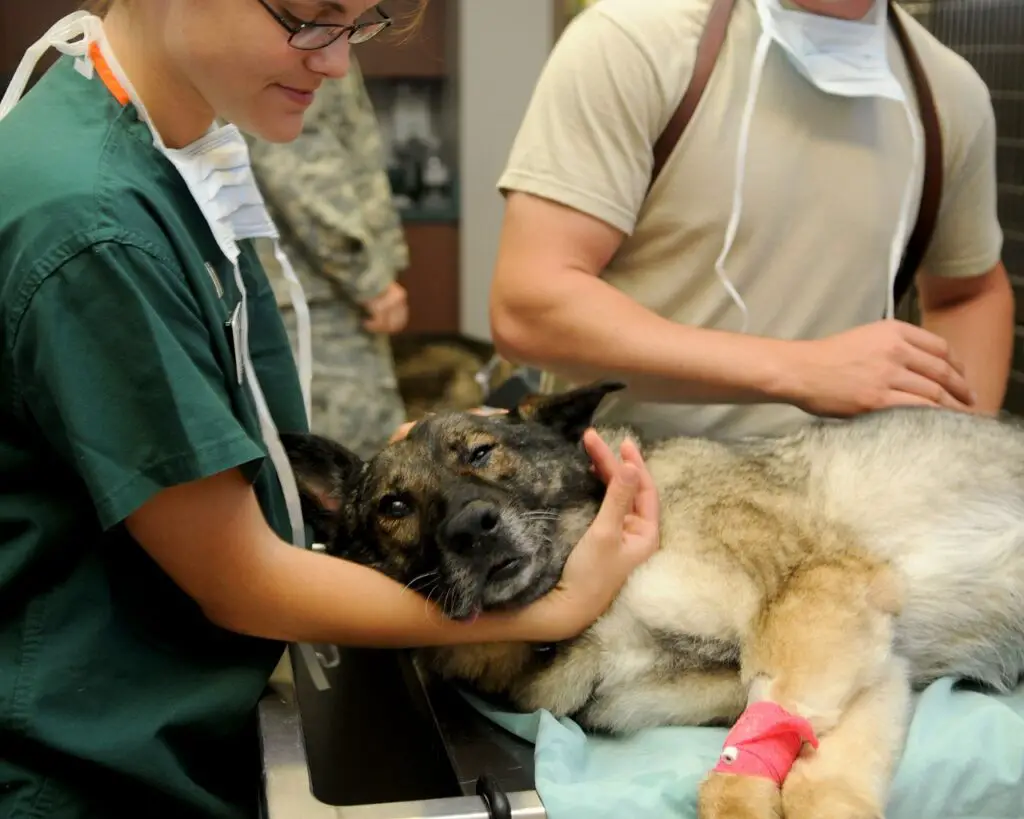The effectiveness of vaccines can vary based on multiple factors, including the individual dog’s health and immune response.
In this post, we’re going to delve into the effectiveness of the rabies vaccine for dogs, exploring its role in protecting our furry friends from this deadly disease.
About Dog Rabies Vaccine

Rabies is a severe, and often fatal, viral disease that can affect all mammals, including dogs. Vaccination is the most effective way to prevent this disease.
Generally, puppies receive their first rabies vaccine between 12 to 16 weeks of age, which stimulates the immune system to make antibodies.
Vaccination Guidelines
All dogs should be vaccinated and revaccinated against rabies according to product label directions. If a previously vaccinated animal is overdue for a booster, it should be revaccinated.
Different states have different laws regarding the frequency of rabies vaccinations. Some require annual vaccinations, while others mandate it every three years.
Side Effects
Like any medication, vaccines can cause side effects. Most dogs don’t suffer any ill effects from a rabies vaccination, but a small number might experience mild fever, loss of appetite, and mild to moderate loss of energy for 24 to 36 hours after vaccination.
Rabies Vaccination and the Law
In many places, rabies vaccinations are not just recommended; they’re required by law. For example, California law requires each dog older than three months to be vaccinated against rabies and licensed before it is five months old.
Does Dog Rabies Vaccine Work?

Yes. When administered correctly and on schedule, it has been shown to provide immunity against the rabies virus in over 90% of cases.
The vaccine stimulates the dog’s immune system to produce antibodies that can fight off the virus.
When a dog is vaccinated for the first time, it usually receives a series of two vaccinations. The initial vaccination is followed by a booster shot a few weeks later.
After this series, a booster is typically given every one to three years, depending on the specific type of vaccine used and local regulations.
While no vaccine is 100% effective, the rabies vaccine is extremely successful at protecting dogs against infection.
In fact, a study found that only 4.9% of rabid dogs had a history of prior rabies vaccination, indicating that most vaccinated dogs are protected from the virus.
However, the effectiveness of the vaccine can be influenced by factors such as the dog’s age, health status, and the presence of any other infections or diseases.
Additionally, the timing and administration of the vaccine are critical to its effectiveness.
Is Rabies Vaccine Enough For Dog Bites?
No. When it comes to dog bites, a rabies vaccine is a critical part of the response but not the only measure that should be taken.
If a person is bitten by a dog, whether the dog is known or unknown, vaccinated or unvaccinated, immediate medical attention should be sought.
If the dog is known and its vaccination status can be confirmed, no anti-rabies prophylaxis may be needed.
However, if the dog’s vaccination status is unknown or if it’s known to be unvaccinated, post-exposure prophylaxis (PEP) might be recommended. PEP typically includes a series of rabies vaccinations given over a period of 14 days.
In addition to the rabies concern, dog bites can also cause other types of infections. Therefore, the wound should be washed thoroughly with soap and water as soon as possible to help prevent infection.
Depending on the severity and location of the bite, other treatments such as antibiotics, a tetanus booster, or stitches might also be needed.
How Long After Rabies Vaccine Is Dog Immune?
After a dog receives a rabies vaccine, it’s not considered fully immunized until 28 days after vaccination. The vaccine prompts the dog’s immune system to produce antibodies that fight the rabies virus.
However, this process takes some time, which is why there’s a gap between vaccination and when the dog is considered fully protected.
In terms of long-term immunity, there are rabies vaccines labeled as being effective for either one year or three years.
However, studies have demonstrated that most dogs retain immunity for several years post-vaccination. Some research even suggests that the immunity could last for 7 to 9 years in some cases.
Booster vaccinations are crucial in maintaining this immunity. For example, a booster may be required six months after the first vaccination, especially for dogs without previous vaccination.
The specifics can depend on local regulations, the dog’s health status, and potential exposure to the virus.
It’s important to remember that while the rabies vaccine is highly effective, no vaccine is 100% foolproof. Therefore, it’s still essential to avoid exposing your dog to situations where they might come into contact with the rabies virus.
Are All Rabies Vaccines Good For 3 Years?
Veterinarians administering rabies vaccines are required to certify the full duration of immunity, as stated on the vaccine label (either 1 or 3 years), on all rabies vaccination certificates.
While three-year rabies vaccines are recognized in all 50 States, the requirements for revaccination can vary. Some state municipalities may still require annual or biannual revaccination for rabies.
There are rabies vaccines that are labeled as being effective for either one year or three years. The actual contents of the vaccine are generally the same.
The difference lies in the frequency of administration as recommended by the manufacturer and local laws.
Recent research suggests that rabies vaccines may provide immunity for more extended periods, potentially up to five years in some cases.
However, despite this potential longevity, most regulations and guidelines still recommend a three-year cycle for booster shots.
Can I Give My Dog Rabies Vaccine at Home?
No. While it’s technically possible to administer some vaccines to your dog at home, rabies is not one of them.
The administration of the rabies vaccine is heavily regulated due to its significance for public health.
The majority of states in the U.S., and many other countries, require that a licensed veterinarian or a veterinary technician under the direct supervision of a veterinarian administer the rabies vaccine.
If you were to vaccinate your own dog for rabies, state public health and law enforcement officials may not recognize your vaccination as valid.
This could have significant implications if your dog were to bite someone or be suspected of having rabies.
Furthermore, giving a rabies vaccine involves handling a live virus, which can have serious health implications if not done correctly.
It’s also important to note that administering a vaccine is more than just giving an injection.
It involves assessing the overall health of the animal and understanding potential risks.
In Conclusion
The rabies vaccine for dogs is highly effective and plays a crucial role in protecting pets from this fatal disease.
While no vaccine offers a 100% guarantee, research shows that vaccinated dogs rarely contract the disease.
Moreover, long-term immunity studies suggest that most dogs retain some level of protection for several years post-vaccination.
The global impact of dog vaccination against rabies is significant, contributing to the prevention of human rabies deaths worldwide.
Hence, regular and timely vaccination of dogs is not only essential for their health but also for public safety.





Leave a Reply